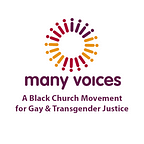Putting Down Other People’s Crosses: A Chaplain’s Road Map
Many Voices presents Rev. F. Romall Smalls’ reflections as part of our biweekly series, It’s Time to Talk about Healing. Because religious trauma is a pervasive experience among Black gay and transgender Christians, this series may include language and experiences that are hard for you to read. We want you to take care and be gentle with yourself.
The experience of being told that the Creator of the Universe hates you causes some of the worst forms of trauma I have ever seen. My job as a Pastoral/Spiritual Care Counselor is to help people heal from such damaging religious experiences.
I spend most of my workdays sitting, listening, counseling and praying with people impacted by some from of religious trauma. Many are carrying the crosses of other people’s ignorance and lack of empathy, and it is harming them profoundly.
I hear statements like
I am ashamed of my HIV status because I was taught in church/synagogue/temple/mosque that sex was a sin.
I can’t tell my family that I’m Gay/Bi/Lesbian because growing up, they let me know that people like me are going to hell.
I walk with clients as they seek to put down other people’s crosses that are not their own.
The first step on the road to healing from such “church hurt” is to aid those who have been cast out of the body of faith back into a right relationship with G-d. “Right” does not mean correct by their parents’ or societal standards. In the process of healing from years of condemning sermons, self-hatred, and soul crushing stigma, “right” in this context simply means developing a right, functioning connection to the Most High that works for them.
How can you have a relationship with the Most High if, in your heart, you believe the malformed theology that purports that anyone like yourself who is not a cis-gender heterosexual is an “abomination”?
The next step to healing from that kind of spiritual trauma is to seek an understanding that you do not have to ascribe to any theology that fundamentally cuts you off from G-d. It is amazing to help Trans and Intersex clients discover that the ancient Hebrew word that is translated into the noun “Adam” has a wide semantic range which includes a non-gender-specific term for “human.”
Let go of the limiting theologies that do not include you in the story of creation and redemption. Do not hold onto a faith system that lacks the depth and complexity of the sacred texts they purport to be based on.
We can read in Genesis, without twisting or omitting anything — just applying good old fashion Hebrew word study — how G-d created everything with intention, diversity, and care. Once created, G-d looked at it all and said it was good. This revelation is not only moving, it is therapeutic and the building block of healing from spiritual trauma.
Please note, however, that while word study of the rich and complex original languages of our Abrahamic faith texts does not placate the inherently complex issue of reconciling 3,000 year old customs, values, and beliefs with our own modern norms, science, and insight, it does help. Ancient Hebrew, Arabic, and Greek have much more nuanced forms of expression and meaning than English that must be explored as we seek to engage these texts with integrity.
This work is not easy and it can’t occur in just one or many spiritual counseling sessions — even with a self-identified member of the Same Gender Loving, Bisexual, Trans and Intersex community, who may even work out of a Black, Latinx Liberation, Womanist, Feminist, Queer Theology bolstered with a rich sex-positive, psychologically-oriented perspective.
It requires, like all forms of healing and enlightenment, a lifetime commitment of self-reflection and positive reinforcement.
This is why anyone’s journey to healing from religious trauma must include finding a spiritual home and spaces that feed and develop faith, whether in formal houses of worship or SGBT support groups.
Whatever the space may be, it should actively assist in unlearning all things that caused us such deep spiritual wounds. As a client who struggles with their sexuality and HIV status once told me, It’s hard undoing 50 years of how you grew up, your culture and history.
I acknowledge and empathize with that fact, and also point out that every journey to recovery and healing begins with the first step of connecting with a community that seeks to help you heal.
When we put down other people’s crosses of stigma, shame and non-liberating theology, we can overcome the religious trauma of our past.
Reverend F. Romall Smalls, M.Div., is associate minister for social justice at Grace Baptist Church in Mount Vernon, a spiritual care counselor, and a Senior Affiliate Chaplain at New York University in New York City,N.Y. Reach him on Twitter or Instagram @romall06
